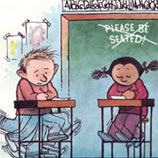 Has anyone else noticed kids are deprived of movement at school? And how short recess is? There are serious implications for this. In my years as a school-based OT, I watched recess become shorter and shorter. Kindergarteners, who have never been in school before, getting 15 minutes every few hours. Then asked to sit upright (and still) the rest of the time in between. I also watched fourth and fifth graders rocking in their chairs, tilting them back at extreme angles, and chewing the tops off of their pencils. I was watching movement deprivation, and kids suffering from under-developed sensory systems because of it. In light of this, I was thrilled to see some teachers provide movement breaks throughout the school day, using tools like "Go Noodle." A chance for kids to get their wiggles out, recharge their brains, and prepare for thinking tasks. At least, that was the hope.
Unfortunately, such movement breaks, brief and linear, provided very short term relief. Kids were quickly back to fidgeting, wiggling, chewing, and walking around: a strong indicator that they need more movement. More intense movement. Vestibular movement. The movement that really turns the brain on and allows for learning, attention, and regulation. Vestibular input gives the strongest sensation and lasts the longest in the brain. The vestibular system is activated when the head changes position in space, and the fluid shifts to provide us with information about where our heads and bodies are. Needless to say, a healthy vestibular system is essential to optimal performance; it is essential for successful engagement in the environment. For all of us. But, for children who are required to sit, listen, and learn for much of the day, they really need movement that activates this system. Only then will a child's brain be awake with its "learning switch" on. Vestibular input can have 6-8 hours of lasting effects on attention and regulation. So, here are some therapeutic movement ideas to consider using at home before school to help kids build healthy vestibular systems and truly charge their brains and bodies for learning:
I know we are all short on time, especially during the morning rush. But for kids with sensory seeking patterns, attention challenges, difficulty self-regulating, and "on the go" tendencies, 10-15 minutes of one or two of these activities in the morning before school could make their day and set them up for success. Recess will be too light and too late for that.
0 Comments
Your comment will be posted after it is approved.
Leave a Reply. |
meet the bloggerAusten is a pediatric occupational therapist with experience in schools, early intervention, and private clinic settings. She now runs her own private practice in Portland, OR specializing in movement based learning techniques. This blog's mission is to educate and empower parents and children by sharing insights into the complexities of learning and development. Categories
All
|
MINDFUL MOVEMENT THERAPIES
In-Home Pediatric Occupational Therapy in Portland, Oregon
phone503-720-4634
|
|
|

